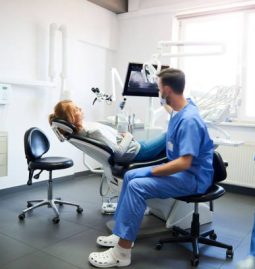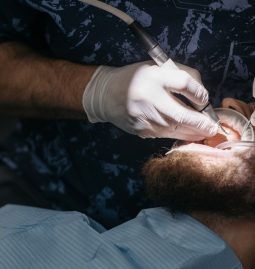Sleep apnea is a condition that impacts the quality of sleep and general health. Many people overlook that sleep apnea can also directly influence their oral health. Learning about these connections can lead to better dental health and overall comfort during daily activities.
What Link Exists Between Breathing Disorders and Dental Issues?
Dry Mouth Problems
One frequent consequence of sleep apnea is dry mouth. Dry mouth happens as breathing through an open mouth increases during sleep apnea episodes. Without the natural moisture of saliva, oral health becomes compromised and vulnerable to several dental concerns.
Saliva carries essential enzymes and provides natural protection against tooth decay. Reduced saliva due to sleep apnea can lead to increased cavities and gum problems. Dealing with persistent dry mouth symptoms early is important to avoid further dental complications.
Teeth Grinding and Jaw Issues
Another dental concern associated with sleep apnea is teeth grinding or bruxism. Individuals with sleep apnea commonly grind their teeth at night, placing unnecessary pressure on dental structures. Grinding teeth disrupts restful sleep and gradually wears down tooth enamel.
Teeth grinding can eventually lead to temporomandibular joint (TMJ) disorder, causing significant pain, difficulty chewing, and even headaches. If you suspect teeth grinding, discuss this issue with your dentist who can provide treatment options.
Development of Cavities and Tooth Decay
Persistent sleep apnea contributes significantly to cavity formation due to insufficient saliva production. When saliva levels remain low, bacteria find an environment conducive to multiplying and promoting acid attacks on teeth. Promptly addressing sleep breathing disorders can reduce cavity risk.
Maintaining a daily oral hygiene routine becomes even more necessary for patients struggling with sleep apnea. Incorporating regular dental checkups ensures emerging tooth decay problems receive timely intervention, minimizing the extensive dental work needed.
Increased Risk of Gum Disease
The connection between sleep apnea and gum disease is noteworthy. Repeated mouth breathing dries oral tissues and increases susceptibility to infection and inflammation. Gum inflammation leads to tissue damage, gum recession, tooth sensitivity, and eventually tooth loss if untreated.
Regular visits to your dentist help detect early signs of gum disease, preventing more severe oral health issues stemming from sleep apnea. Professional dental cleanings can manage associated gum inflammation effectively.
Soreness or Mouth Irritation
Patients dealing with untreated sleep apnea often notice mouth soreness or general oral discomfort upon waking. Mouth breathing overnight can irritate oral tissues, resulting in ongoing redness, bleeding, and tenderness. Such problems interfere with daily routine comfort and eating habits.
Getting evaluated by a qualified sleep specialist helps not only improve sleeping habits but also resolves these uncomfortable mouth symptoms. Seeking early intervention means better overall dental comfort and improved quality of life.
Oral Health Indicators of Sleep Apnea
Dentists often play essential roles in identifying early signs of sleep apnea in patients. Frequent signs are recognized during routine dental care, offering chances for prompt diagnosis and management. Dentists can overcome common barriers and guide patients toward effective treatments.
-
Worn-down tooth surfaces due to grinding
-
Dry, irritated mouth tissues from nightly mouth breathing
-
Inflammation or redness, indicating increased gum redness and bleeding
-
Unexplained tooth sensitivity and pain
The sooner sleep apnea is diagnosed, the easier it is for patients to find relief from oral discomfort. Consulting regularly with a trusted dentist provides key insights into your comprehensive health journey, reflecting positively on everyday activity and wellness.
Reliable Dental Solutions for Sleep Apnea Patients
When experiencing immediate oral discomfort related to sleep apnea, finding an emergency dentist you can count on is essential. Prompt dental care services, like relief from painful toothache episodes or damaged teeth caused by continuous grinding, are easily available. Working with a professional facility specializing in urgent oral health issues ensures proper and timely dental management.
At times, dentists recommend dental devices designed explicitly for managing sleep apnea episodes. Devices such as oral appliance therapy can reduce occurrences of mouth breathing and grinding during nighttime rest.
Oral Appliances as Effective Treatment Options for Sleep Apnea
Oral appliance therapy is an advisable approach frequently recommended by dentists and sleep physicians for managing mild-to-moderate sleep apnea conditions. Customized oral devices comfortably keep airways open during sleep hours, promoting uninterrupted breathing overnight. They are portable, user-friendly, and often more comfortable than severe alternative treatments like continuous positive airway pressure (CPAP) machines.
Your dental professional carefully fits and adjusts these appliances, ensuring maximum comfort and effectiveness tailored specifically to your requirements. Regular follow-ups monitor safety, appliance condition, and patient comfort over time.
Enhancing Oral Hygiene for Sleep Apnea Management
Developing optimal oral hygiene is necessary to avoid dental problems when managing sleep apnea. Daily oral care procedures can lower bacteria buildup, prevent tooth decay, and alleviate gum inflammation risks commonly associated with sleep-disordered breathing.
To enhance your oral hygiene, consider the following strategies:
-
Using mouthwash to reduce harmful bacteria growth effectively.
-
Brushing teeth twice daily using fluoride toothpaste.
-
Flossing regularly to maintain gum health and cleanliness between teeth.
-
Scheduling consistent dental visits for cleaning and checkups biannually.
Taking Steps Toward Healthier Oral Habits
Don’t wait for oral problems linked to sleep apnea to become severe; take action today by consulting dental experts with knowledge in sleep-disordered breathing complications. By identifying early warning signs quickly, you set yourself up for healthier outcomes, reducing oral discomfort and preventing further damage effectively. Dentists partnered with sleep specialists provide comprehensive approaches to protecting both oral hygiene and sleep quality.
Additionally, lifestyle adjustments such as losing excess weight, abstaining from tobacco use, and limiting alcohol intake significantly lessen the severity of sleep apnea. Improved quality of rest minimizes oral health issues and offers marked enhancements in your daily activities and preventive dental maintenance.
Managing Tooth Loss and Replacement Options
Tooth loss is another dental consequence of long-term unmanaged sleep apnea. Persistent dry mouth, gum diseases, and teeth grinding may result in severe tooth decay and eventual loss. Seeking reliable tooth replacement options helps reduce further complications.
If you’re considering replacement options, exploring customized dentures in Concord, NH, or similar dental restorations, provides both cosmetic benefits and functional improvements. Restored teeth structures significantly alleviate oral discomfort from tooth loss and restore proper chewing, speech capabilities, as well as appearance.
Final Thoughts
Addressing how sleep apnea can impact your oral health offers immediate benefits facilitating comfortable daily life. Collaborating effectively with dental and medical professionals brings lasting results, enhancing sleep hygiene and preventing oral discomfort. Maintaining early management strategies contributes significantly toward a healthier, happier lifestyle.








